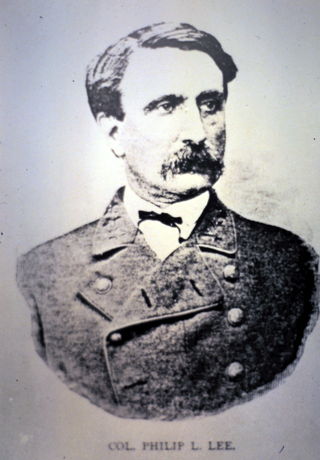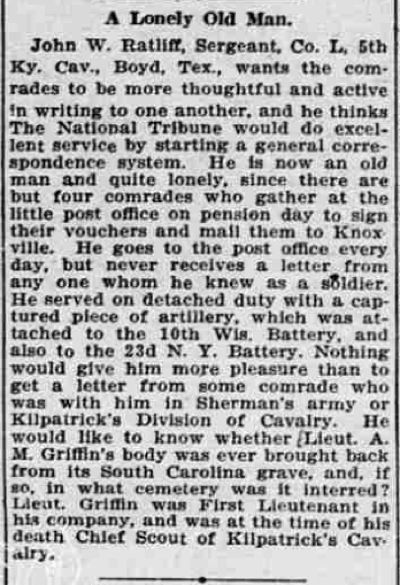
The following article by Charles Hartley originally appeared in The Courier-Journal on 12 Sep 2012. It is archived here with additional information for your reading enjoyment.
A year before the Civil War began, the Kentucky legislature made provision for an active volunteer State Guard, and seven companies were established in the Louisville Battalion including one known as the Bitter Water Blues of Shepherdsville. Philip Lee, a Bullitt County lawyer was the company captain.
Forty-six years later, John W. Ratliff, a member of that company, wrote a letter to the editor of the National Tribune of Washington, D.C. in which he told a fascinating story of how so many of the state guard ended up in the South in 1861. Let's hear it in his own words.
"The Governor of the State called all the State Guards to assemble at Muldraugh's Hill, in Camp Joe Davis, on the L. & N. R. R., to drill and be on the alert for the invader. All the companies were named, not lettered. My company's name was the 'Bitter Water Blues.' So we assembled and began to drill and do camp and picket duty. Everything went on finely for about two weeks, when an order was read at dress parade by Col. Thos. Hunt announcing that one of our comrades had died and that he would be buried by candlelight. The name of the dead comrade was John Barleycorn.
"We were dismissed and got supper. After supper reassembled, and every man was given a large black bottle and a small piece of lighted candle in the mouth of the bottle. 'Forward-March!' was given, and we marched some distance, when we came to a large open grave. Here we were ordered to throw our bottle in and march on. We did so, and were soon back in front of company headquarters.
"Here a barrelful of whisky sat with the head knocked in and a tincup tied to the barrel by a string, and an order from Capt. Phil Lee (my Captain's name) 'to come up and drink and be good boys.' There was a stampede for the barrel and the boys began to drink.
"I had a tent-mate by the name of Joe Samuels, who was a good sober boy (and at that time I was too). I said to Joe: 'Suppose we go home. I don't like this whisky business, and am afraid some one will get drunk and kill some one.' So Joe and I concluded to go home. We walked to the depot, about one mile, and when we got there we saw standing on the sidetrack two trains of cars.
"I stepped over to one of the engines to see what was up, and I found a young engineer whom I knew. I asked him where he was bound for, and he said, 'The Southern Confederacy,' and asked me if I was going. My answer was 'No.' About that time the wagons began to come in bringing the helpless, drunken, poor fellows that were so drunk that they were senseless.
"The teamsters threw them into the open box cars just like so many hogs, and, just as we heard the drums and the rest of the command coming, the northbound express came up and we (Joe and I) got aboard and went home to Shepherdsville, Ky. We were met at the depot by friends, and we told the truth about what had happened and what we had seen. We were laughed at, but the next morning the old Louisville Journal came out and confirmed all that we had said.
"The poor boys who were made drunk and shipped to the Southern camp awoke the next day to find their mistake, and commenced to plan their escape. Quite a number came back home, and, without a single exception, all donned the blue, and all made good fighters for Uncle Sam. Those who stayed were either killed or wounded. But three of the crowd ever came back home after the war was over, viz. Capt. Phil Lee, John Lee, and John Cundiff. Peace to their ashes."
How well Ratliff remembered his tale, we cannot judge, but we do know from other sources that many of these young men remained in the South as members of what would become known as the Orphan Brigade. Also, on July 11, 1861, The Louisville Courier (one of the forerunners of The Courier-Journal), then a secessionist newspaper, reported that "there had been a perfect exodus of gallant stalwart Kentuckians through this city to Tennessee to join the Southern army."

Philip Lee was a strong advocate for the Southern cause, and was responsible for enlisting more than a hundred young men to the cause. Edwin Porter Thompson, in his 1868 book, History of the First Kentucky Brigade (later known as the Orphan Brigade), wrote that these men were "emphatically young men, for there was but one married man among them all."
Ratliff, a son of Ambrose and Mary Eliza (Glass) Ratliff, was himself likely about 17 at the time, and his friend, Joe Samuels (son of Robert F. and Malinda Samuels), would have been even younger. Ratliff was living on a small farm just outside Boyd in Wise County, Texas when he wrote his story. According to his own account, he served with Company L of the Fifth Kentucky Union Cavalry during the war.
While Ratliff may have exaggerated the number of men who made their way back to serve the Union cause, his story helps us realize the great divisions that existed in this area between North and South on the eve of that gathering storm.
Additional Details
Organization of Kentucky State Guard Louisville Battalion-organized May 7, 1860. Co. 1, Citizens Guards of Louisville. Co. 2, National Blues of Louisville. Co. 3, Jackson Guards of Louisville. Co. 4, Hardin Company of Light Infantry of Elizabethtown. Co. 5, Nelson Grays of Bardstown. Co. 6, Bitter Water Blues of Shepherdsville. Co. 7, Citizen's Artillery of Louisville.
Bitter Water Blues, Sheperdsville, Bullitt County, Kentucky, commissioned on May 14, 1860. Officers were: Philip Lee, Captain; A. H. Field, 1st Lieutenant; J. W. Rodgers, 2nd Lieutenant; and James W. Hogland, 3rd Lieutenant; and Charles Samuels, 3rd Lieutenant (appointed on January 17, 1861).

He Heard From Them.
John Ratliff wrote the letter shown to the right in April, 1909, in the hope of receiving correspondence from others who were comrades in the Civil War. Some three months later, he wrote to the paper again with good news.
John W. Ratliff, Boyd, Tex., says that some time ago he wrote to The National Tribune, and asked the survivors of Sherman's army, and particularly Kilpatrick's Division, to write to him as he was away down in Dixie and very lonesome. He has been surprised and delighted at the number of letters he has received, all breathing warm, comradely feelings. Up to date he has received just 40 of these letters, one coming from as far as Switzerland.
Earlier, in October 1895, he had written to the paper, looking for a young orphan boy to assist on his Texas farm.
Home for a Veteran's Son
Editor National Tribune: I want a boy to do light work on a small farm. Will board, clothe, and pay all doctors' bills should any occur, and educate him in common branches. I will give him the comforts of a good home (I have no family but my wife), in a good, quiet settlement as there is in Texas, and very healthy; plenty of free district schools. The County has just gone in favor of prohibition, and this part of the County is thickly settled. A desirable country to live in. I am within three miles of Boyd on the Chicago, Rock Island, & Texas Railroad. A veteran's son - orphan - preferred, between the age of 10 and 15. I can furnish references if required. Write me. - John W. Ratliff, Co. L, 5th Ky. Cav., Boyd, Wise Co., Tex.
According to the 1900 census, John and his wife had made a home for not one, but two children.
1900 Federal Census: Texas, Wise County, Precinct 4, page 157B, household 95/95
Ratliff, John W. - head, W M 57, born Jan 1843 in KY, married 21 years, parents born KY, farmer
Ratliff, Annett M. - wife, W F 39, born Mar 1861 in MS, no children, parents born MS
Greggs, Oliver - adopted, W M 16, born Jun 1883 in TX, father born TX, mother born MS, at school
Greggs, Pearl - adopted, W F 13, born Jun 1886 in TX, father born TX, mother born MS, at school
John and Annette were alone in 1910, still in Wise County, Texas, but sometime after that they moved to Hinton, Oklahoma where John died in November 1915. They had no children.
Copyright 2012 by Charles Hartley, Shepherdsville KY. All rights are reserved. No part of the content of this page may be included in any format in any place without the written permission of the copyright holder.
The Bullitt County History Museum, a service of the Bullitt County Genealogical Society, is located in the county courthouse at 300 South Buckman Street (Highway 61) in Shepherdsville, Kentucky. The museum, along with its research room, is open 10 a.m. to 4 p.m. Monday through Friday. Saturday appointments are available by calling 502-921-0161 during our regular weekday hours. Admission is free. The museum, as part of the Bullitt County Genealogical Society, is a 501(c)3 tax exempt organization and is classified as a 509(a)2 public charity. Contributions and bequests are deductible under section 2055, 2106, or 2522 of the Internal Revenue Code. Page last modified: 12 Sep 2024 . Page URL: bullittcountyhistory.org/memories/ratliff.html